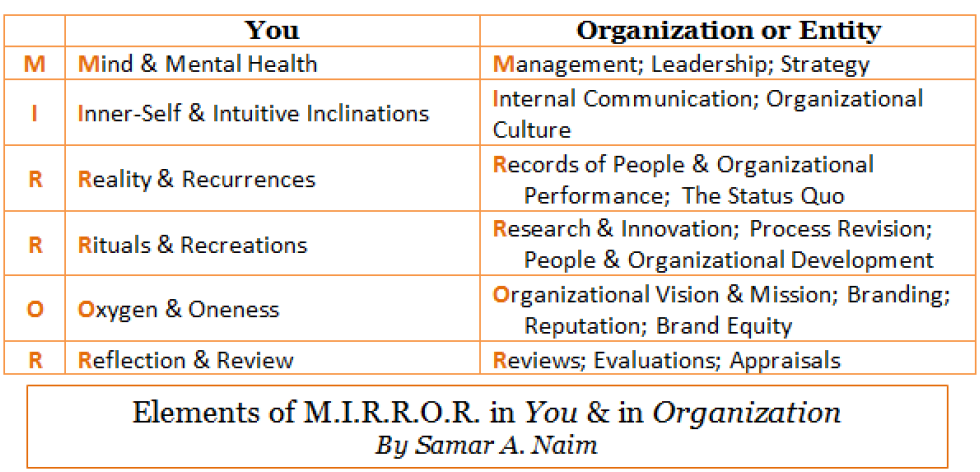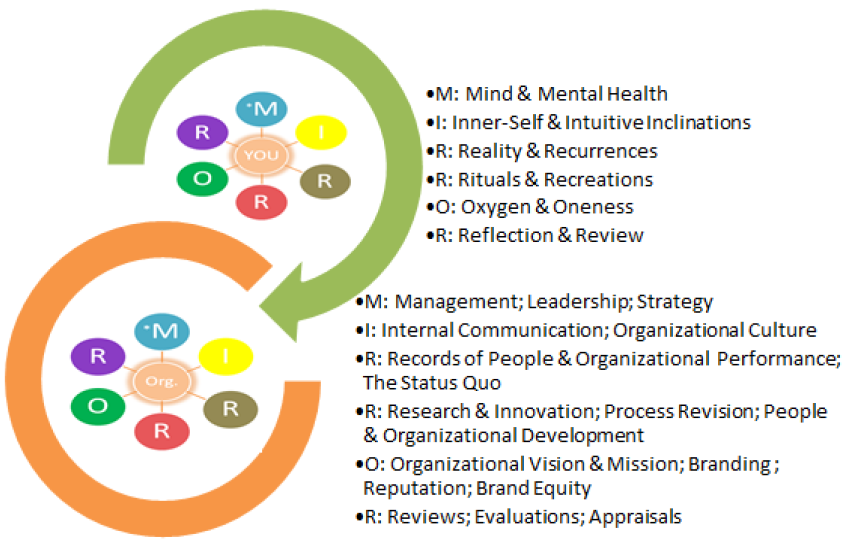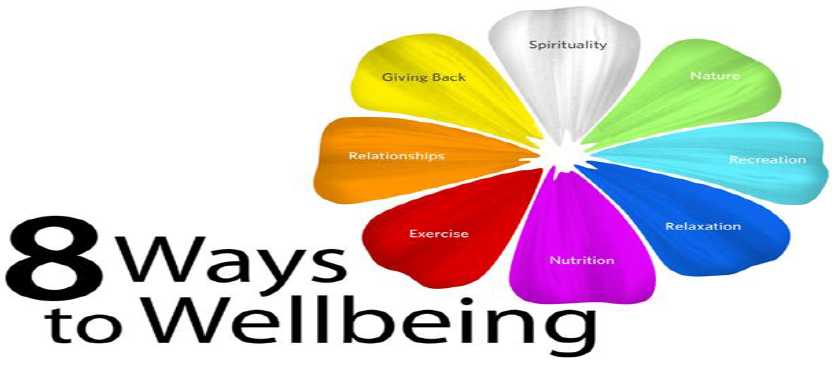Self-Care & Coaching:
Taking care of yourself can help you become a better person. This is at the core of coaching. Whether you are a coach or a client, embracing M.I.R.R.OR will give you clarity, help you be present in the moment, and contribute to your wellness and progress. There are two well-known Arabic sayings that I find very helpful in explaining how
M.I.R.R.O.R can affect not only you but also those around you (in whatever role you are playing):
فاقد الشيء لا يعطيه You Can’t Give What You Don’t Have
كل اناء بما فيه ينضح Out of the abundance of the heart the mouth speaks
Self is a personal word. Isn’t it? So at first glance, self-care may be associated with life, health and wellness coaching. But that is not the case for me. I find it at the core of all types of coaching including business, career, and executive coaching. Simply put, behind all these types of coaching scenarios and niches are people… human beings… selves. You need them to carry out the tasks of the business, for example. If they are not taking care of their M.I.R.R.O.R. this will manifest itself in their work (through productivity/ absenteeism/ efficiency… Etc.). Additionally, many executives go through periods of stress and burn-outs. Practising self-care would help them reduce those levels of stress and safeguard themselves in future challenges. Further, those owning a new business, leading teams, transitioning to a new career… they all would be better off minding and assessing their M.I.R.R.O.R throughout the process.
Applying M.I.R.R.O.R to Organizations & Entities?!
Yes, you can. To explore and assess how much self-care your organization or entity is engaging in (with regards to its philosophy and practices), all you need to do is to treat your organization or entity as one whole being or self. The table below identifies the elements of M.I.R.R.O.R in You and in Organization:
Strategies & Techniques to help you with your M.I.R.R.O.R:
Strategies from Experts:
I. Cheryl Richardson author of The Art of Extreme Self-Care outlines 3 self-care strategies that would transform your life:
- Discover when, where, why and how you feel deprived by asking yourself these key questions: o Where do I feel deprived?/ What do I need more of right now?/ What do I need less of?/ What do I want right now?/ What am I yearning for?/ Who or what is causing me to feel resentful and why?/ What am I starving for?
- Find your own rhythm and routine. Ask yourself: “What one routine could I put into place this month that would improve my life the most?” Once you have named the routine, Richardson suggests writing it down on an index card then thinking of how you will schedule it into your life for the next 30 days.
- Create an “absolute no list”: Richardson describes this list as “a list that makes you feel safe, protected, taken care of, and free to be your best self.” She advises to create your own list by “looking for those activities you no longer do, no longer want to do, or would like to give up at some point in the future.” She also encourages to pay attention to the things that frustrate you.
Some examples:
o Not rushing/ Not keeping anything that you don’t love or need/ Not answering the phone during dinner/ Not participating in gossip…
II. Dr. Roger Walsh, a professor of psychiatry, philosophy, anthropology, and religious studies at the University of California discusses Therapeutic Lifestyle Changes (TLCs) that he believes are
underutilized despite considerable evidence of their effectiveness in both clinical and normal populations.
Though these changes are titled as therapeutical, I find them naturally relevant to self-care. They include common activities and philosophies that you can incorporate in your day-to-day life.
8 Ways to Well-Being and Their Benefits (from often unrecognized TLCs) , by Dr. Roger Walsh, author of “Life and Mental Health” article
- Exercise not only helps people feel better by reducing anxiety and depression. It can help children do better in school, improve cognitive performance in adults, reduce age-related memory loss in the elderly, and increase new neuron formation in the brain.
- Nutrition and Diet rich in vegetables, fruits and fish may help school performance in children, maintain cognitive functions in adults, as well as reduce symptoms in affective and schizophrenic disorders.
- Spending Time in Nature can promote cognitive functions and overall well-being.
- Number and Quality of (Good) Relationships can reduce health risks ranging from the common cold to strokes as well as multiple mental illnesses, and can enhance psychological well-being dramatically.
- Recreation and Enjoyable Activities can reduce defensiveness and foster social skills.
- Relaxation and Stress Management can treat a variety of anxiety, insomnia, and panic disorders. Meditation has many benefits. It can improve empathy, sensitivity and emotional stability, reduce stress and burnout, and enhance cognitive function and even brain size.
- Religious and Spiritual Involvement that focuses on love and forgiveness can reduce anxiety, depression and substance abuse, and foster well-being.
- Contribution and Service to Others or altruism, can enhance joy and generosity by producing a “helper’s high.” Altruism also benefits both physical and mental health, and perhaps even extends lifespan.
Some of My Recommended Strategies & Techniques:
References:
3 Self-Care Strategies to Transform Your Life. Psychcentral. Retrieved Dec 20, 2013 from 10 Tips for Personal Self Development. Matt Morris. Retrieved Dec 16, 2013 from
http://www.mattmorris.com/personal-development-2/personal-self-development-plan/
Beyond Tender Loving Care: ‘TLCs’ Promise Health and Happiness. American Psychological Association. Retrieved Dec 20, 2013 from http://www.apa.org/news/press/releases/2011/02/beyond-tlc.aspx
Meaning of Self- Development. Oxford Dictionaries. Retrieved Dec 16, 2013 from http://www.oxforddictionaries.com/definition/english/self-development?q=self-development
Meaning of Self-Management. Oxford Dictionaries. Retrieved Dec 16, 2013 from http://www.oxforddictionaries.com/definition/english/self-management?q=self-management
Meaning of Self- Love. Oxford Dictionaries. Retrieved Dec 16, 2013 from http://www.oxforddictionaries.com/definition/english/self-love
Meaning of Well-Being. Oxford Dictionaries. Retrieved Dec 16, 2013 from http://www.oxforddictionaries.com/definition/english/well-being?q=Well-being
Top 10 Tips for Self-Management. Pansophix. Retrieved Dec 16, 2013 from




